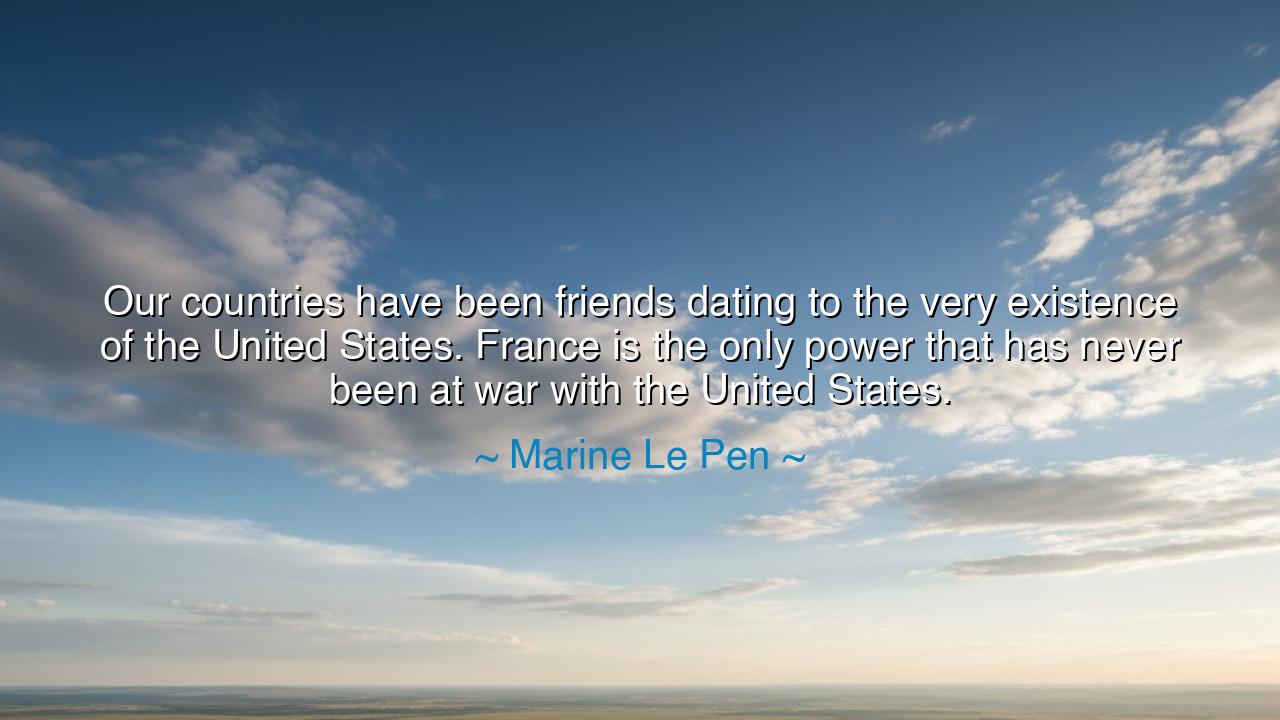
Our countries have been friends dating to the very existence of
Our countries have been friends dating to the very existence of the United States. France is the only power that has never been at war with the United States.






In the annals of republics and revolutions, a voice proclaims a kinship across the sea: “Our countries have been friends dating to the very existence of the United States. France is the only power that has never been at war with the United States.” So speaks Marine Le Pen, invoking the old cords that once lashed a newborn nation to an ancient kingdom. The meaning she reaches for is clear as a lighthouse: that between France and the United States there runs a current of shared ideals—liberty argued in salons and on battlefields, fraternity toasted in taverns and in marble halls. She calls us to remember the cradle-years when the tricolor and the stars-and-stripes learned each other’s wind.
The origin of such confidence lies in the revolutionary dawn. When the American experiment was young and trembling, France sent not only gold and muskets but also men whose names read like psalms: Lafayette, Rochambeau, de Grasse. At Yorktown, the French fleet sealed the bay like a clasped hand while allied cannon sang the last stanza of imperial rule. Later, a colossal copper woman—Liberty Enlightening the World—crossed the Atlantic as a sacrament of the friendship: torch upraised, tablet inscribed, a reminder that sister republics can kindle each other’s courage. In this memory, “friends dating to the very existence” is no mere phrase; it is a ledger written in blood and bronze.
Yet the sentence also carries a claim that history, stern schoolmaster, will not let pass unexamined: that France has never been at war with the United States. Here the record grows knotty. In the 1790s came the Quasi-War, an undeclared naval conflict where American frigates traded broadsides with French privateers—the USS Constellation taking L’Insurgente upon the open sea. A century and a half later, in the sand-bright hours of Operation Torch (1942), American troops clashed with Vichy French forces before a ceasefire reunited former comrades against tyranny. These are thorns on the rosebush of alliance: brief, painful, and real.
What then is the deeper meaning of Le Pen’s words? Not documentary precision, but mythic emphasis. She reaches for the larger truth that, despite tempests and misunderstandings, the prevailing tide between France and the United States has been one of friendship—of philosophies that rhyme (rights, citizenship, the dignity of the governed) and of artists, soldiers, and scholars crossing a bridge of ideas. Her assertion elevates symbol over footnote, inviting both nations to behave not as perfect partners but as partners striving toward the perfection of their shared ideals.
A story may illuminate the living heart of this bond. In 1917, when American troops landed in France, General Pershing stood at Lafayette’s tomb and offered a vow: “Lafayette, we are here.” Across a century, gratitude had not cooled. And in 2001, when smoke rose over Manhattan, the Eiffel Tower went dark—then shone again—a silent vigil for grief not its own. These gestures are the currency of comradeship: not treaties signed in ink alone, but recognitions offered from soul to soul.
Yet the wise student of nations must keep both scrolls open: the scroll of myth that inspires, and the scroll of history that corrects. If myth alone rules, we drift into flattering error; if history alone chastens, we may forget why bonds are worth mending. The high road is to honor the friendship while confessing its storms—to admit the Quasi-War, to remember Vichy’s tragic hour, and still to celebrate Yorktown’s embrace, Verdun’s debt repaid, Normandy’s beaches taken back together, and the long labor of diplomacy and culture ever since.
What lesson shall we carry forward? First, that alliances are living things: they must be tended with truth as much as with toasts. Second, that patriotic love grows stronger—not weaker—when it can face the entire past without flinching. Third, that peoples who share a vocabulary of liberty should practice it toward one another: candor without contempt, loyalty without blindness, and memory without malice.
Take these as practical counsels. (1) When leaders speak in shining generalities, study the record; let knowledge be the guardian of love. (2) Celebrate the symbolic ties—Yorktown, Lafayette, the Statue of Liberty—and teach them to the young, so gratitude endures. (3) Acknowledge the knots—Quasi-War, Vichy—so humility guards against hubris. (4) Invest in the everyday bridges: language learning, student exchanges, joint scientific work, sister cities—small mercies that outlast electoral weather. Do this, and the friendship Le Pen invokes will be not only remembered but renewed: a bond honest enough to bear correction, and sturdy enough to carry hope across the sea.






AAdministratorAdministrator
Welcome, honored guests. Please leave a comment, we will respond soon